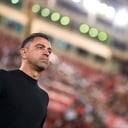Spain’s run of 136 competitive games with more possession than their rival — going back 16 years to the 2008 European Championship final — has finally come to an end.
Croatia had 53 per cent of the ball in Saturday’s opening Euro 2024 game of Group B, but Luis de la Fuente’s side won 3-0.
It is tempting to view the end of that incredible statistical run as a pity — especially given it spanned historic victories for Spain at the 2010 World Cup and Euro 2012.
Advertisement
Instead, many inside and outside the Spain camp celebrated losing possession to Croatia as the long-overdue modernisation of an outdated and increasingly unpopular style of play.
Since taking charge of Spain following the 2022 World Cup, De la Fuente has spoken a lot about making his team more “vertical” or direct. It has been a theme throughout media appearances in the build-up to this tournament in Germany, with player after player saying they would avoid keeping possession for possession’s sake.
“The philosophy has always been similar but each coach has their own touches,” Spain and Manchester City midfielder Rodri told The Athletic at the country’s pre-tournament camp. “(De la Fuente) wants to be a bit more direct, using possession always to damage the opponent. You have to change the chip (our approach).”

That certainly seemed to be the case against Croatia. Spain’s opening goal came from a counter-attack, with Fabian Ruiz producing a quick pass to release Alvaro Morata for a cool finish. Goals from Fabian and Dani Carvajal, both involving Lamine Yamal, meant the result was decided by half-time.
De la Fuente put that clinical start down to the profile of the squad’s attacking players — including 16-year-old Barcelona starlet Yamal and Athletic Bilbao winger Nico Williams, 21.
“If we have players with the pace of Lamine, Nico, Ferran (Torres) or Ayoze (Perez), it makes no sense not to use those options,” the coach said. “We’re very dangerous in these types of situations.”
Many heralded the result as the dawn of a new era for Spain, making them more dangerous and more likely tournament winners. Some said that the age of ‘tiki-taka’ was finally over.
That term became closely associated with Pep Guardiola’s Barcelona team from 2008-2012 and Spain after the Euro 2008 win under coach Luis Aragones. Their way of playing became more defined under his successor Vicente del Bosque, who tried to field as many ball-playing midfielders as possible — including the Barca trio of Sergio Busquets, Andres Iniesta and Xavi.
That Spain team smothered their opponents with possession, often winning games by a narrow margin. At the 2010 World Cup, they won each of their knockout games 1-0 — and did the same in the final against the Netherlands, where they had 63 per cent of the ball over the 120 minutes.

GO DEEPER
Michael Cox’s Iconic Teams of the Decade: Del Bosque’s Spain suffocate their opponents with possession
When striker David Villa was injured ahead of Euro 2012, Del Bosque decided to use midfielder Cesc Fabregas as a false nine instead. Fans and pundits questioned the move, but it worked as Spain won a third successive international trophy, beating Italy 4-0 in the final with 52 per cent of the ball.
Advertisement
Despite Spain’s unprecedented success, their style of play remained the subject of fierce debate. Del Bosque himself felt they needed to evolve and become more direct, calling up the rampaging centre-forward Diego Costa, born in Brazil, for the 2014 World Cup.
Every one of their coaches since — including Julen Lopetegui, Fernando Hierro, Luis Enrique and Robert Moreno — has talked about “modernising” Spain by adding “verticality” and pace in attack. But their teams continued to dominate possession, as the graphic below shows.
Spain’s opponents knew the best way to beat them was to sit deep, soak up the pressure and hit them on the break or take a chance at set pieces. That led to some of the biggest embarrassments in the country’s football history.
In the last 16 of the 2018 World Cup against hosts Russia, Hierro’s side had 79 per cent possession, took 23 shots but scored just once before their elimination on penalties. At the 2022 World Cup in Qatar, Luis Enrique’s team recorded a 77 per cent figure against Morocco in the last 16 but managed one shot on target during a goalless 120 minutes and lost 3-0 in the resulting shootout.

On Saturday, Croatia’s midfield trio of Luka Modric, Mateo Kovacic and Marcelo Brozovic tried to impose control through keeping possession.
That stat was not the only one Croatia ‘won’ over the 90 minutes. Zlatko Dalic’s team had more shots (16, five on target) than Spain (11, five on target). They edged the expected goals (xG) by 2.38 to 2.01, helped by the late penalty conceded by Spain after a defensive mess involving goalkeeper Unai Simon and Rodri.
The tiki-taka debate has led to some strange scenes in recent years. In September 2013, Barca fans and pundits heavily criticised then-coach Gerardo Martino for his team ‘losing’ possession against Rayo Vallecano — even though they had won 4-0.

GO DEEPER
The Airbnb-ification of Barcelona's once-unique style
On the other side have been those who were bored or even upset by Spain’s dominance of possession. Certain commentators labelled it as “woke” within the broader culture wars across different areas of society. On social media, some celebrated the World Cup exits to Russia and Morocco as if they were a vindication of their wider political outlook.
Advertisement
De la Fuente has yet to be asked about those connections and tends to stick to football in his public appearances — taking special care to avoid anything to do with the disgraced former Spanish federation president Luis Rubiales.
But everyone around Spain’s national team is well aware that dominating possession but exiting tournaments is not popular with anybody. De la Fuente and his players are keen to avoid that happening again and know that speaking publicly about the change of style suits them.

GO DEEPER
Mind the gap: Yes, Spain won 3-0, but they left far too much space between their lines
Nobody should get too carried away, however, as this Spain team are still packed with ball players, especially the midfield three of Rodri, Fabian and Pedri.
Spain averaged 68 per cent possession in their games under De la Fuente before Saturday, even as he added new wingers and talked about a different approach. They could well have more of the ball against Italy tonight (Thursday) and will likely win possession against Albania on Monday too. Although they would like it if more opponents took the game to them in the same way as Croatia.
“We are making a team with many ways of playing,” De la Fuente said. “Our rivals know we can hurt them with possession, with positional attacks built with many passes or also — if they give us the chance — we will run very fast.”

GO DEEPER
Why direct football will always have a place in the Premier League
(Top photo: Sebastian Christoph Gollnow/picture alliance via Getty Images)

